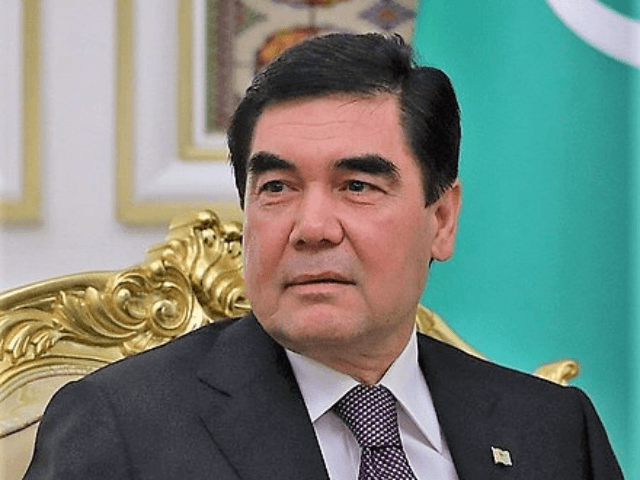The government of Turkmenistan banned the use of the word “coronavirus” in public and empowered police to arrest anyone wearing medical masks in public, Reporters Without Borders revealed on Tuesday.
The repressive Central Asian nation claims it has yet to document a single case of the Chinese coronavirus, despite the ongoing pandemic hitting Iran, which borders Turkmenistan, particularly intensely. Turkmenistan joins a dwindling list of repressive and remote states – like North Korea or Papua New Guinea, respectively – who have no official proof of any coronavirus cases in the country.
Reporters Without Borders cited reporting from within the country’s capital, Ashgabat, reproduced in the local language through the Turkmen branch of Radio Free Europe/Radio Liberty (RFE/RL). That reporting painted a grave picture of government officials persecuting individuals who spoke aloud of the pandemic or appeared to be protecting themselves from it. Police are reportedly hiding undercover at bus stops and other populated areas to eavesdrop of the capital’s locals and seize anyone who violates the order.
Turkmenistan’s dictator Gurbanguly Berdymukhammedov also banned state-run media, the only legal form of media in the country, and health officials from distributing safety information about the virus or using the word “coronavirus” in any publicly available material. It is not clear from the reports if the limits extend only to mentions of the Chinese coronavirus or of other types of coronavirus such as the common cold and Middle East Respiratory Syndrome (MERS).
“In place of old brochures instructing citizens about ways to prevent the spread of the virus, new publications replace the word ‘coronavirus’ with words like ‘illness’ and ‘acute respiratory diseases,'” RFE/RL, translating its Turkmen coverage, reported on Tuesday. The outlet claimed that the government “sealed off” Ashgabat on March 20, presumably to prevent visitors from bringing the Chinese coronavirus, but did not offer any explanation for the decision.
The original article at Azatlyk, the RFE/RL affiliate, quoted anonymous locals who said police “take away people for any talk about the coronavirus. Special people [undercover officers] listen to conversations in [store] lines, at bus stops, on buses.”
As the government has not announced its repressive measures, much less justified them, it is unclear why Turkmenistan has banned any mention of the pandemic. North Korea, in contrast, regularly updates its population through its state media on the growing number of coronavirus cases in South Korea, and has even printed information thanking the United States for offering humanitarian aid in the event of an outbreak there.
Like North Korea, Turkmenistan is a close ally of China’s. Turkmenistan sells China more natural gas than any other country and is an active participant in the Belt and Road Initiative (BRI), China’s plan to dominate the world’s major transportation hubs by offering underdeveloped nations in Africa, the Middle East, and Europe predatory loans.
“Thanks to the long-term China-Turkmenistan friendship, bilateral cooperation, with broad prospect for further development, has reapt bumper harvest under the framework of the Belt and Road Initiative in recent years,” vice chairman of China’s National People’s Congress (NPC) Standing Committee Wang Chen said during a visit to Ashgabat in 2017 to promote the BRI.
Chinese dictator Xi Jinping most recently visited Ashgabat in 2013.
The Chinese Communist Party has denied that, as scientists have largely concluded, the Chinese coronavirus pandemic began in the central city of Wuhan, the product of the largely unregulated sale of wild animal meat at a “wet market” there. Instead, Beijing has claimed that the virus was created in a laboratory in Maryland by the United States Army, an allegation it has provided no evidence for.
Wuhan, China, is home to one of the most advance virus research laboratories in the world.
In Ashgabat – where the government has not issued any speculation on the origin of the virus – reports indicated that panic surrounding a potential coronavirus lockdown has resulted in shortages of food and basic needs, as well as extreme price gouging.
“Not a single pharmacy or store sells antiseptic drugs, gels, or napkins,” the report read. “Although at the entrance to Berkarar there are tables with bottles of antiseptics for free use.”
These shortages, speech restrictions, and other adverse effects of coronavirus panic appear to be affecting only the poor in Ashgabat. A report from the Organized Crime and Corruption Reporting Project last week indicated that senior government officials have all but abandoned the city and moved to a “local nature reserve” to stay away from crowded areas, and potentially avoid coronavirus infection, until the pandemic is over.
“The Turkmen authorities have lived up to their reputation by adopting this extreme method for eradicating all information about the coronavirus,” Jeanne Cavelier, the head of Reporters Without Borders’ Eastern Europe and Central Asia desk, said in a Tuesday statement. “This denial of information not only endangers the Turkmen citizens most at risk but also reinforces the authoritarianism imposed by President Gurbanguly Berdymukhammedov. We urge the international community to react and to take him to task for his systematic human rights violations.”
The organization also noted that it had ranked Turkmenistan last among all the world’s nations in press freedom in its 2019 list, making it a more repressive country for journalists than North Korea.

COMMENTS
Please let us know if you're having issues with commenting.